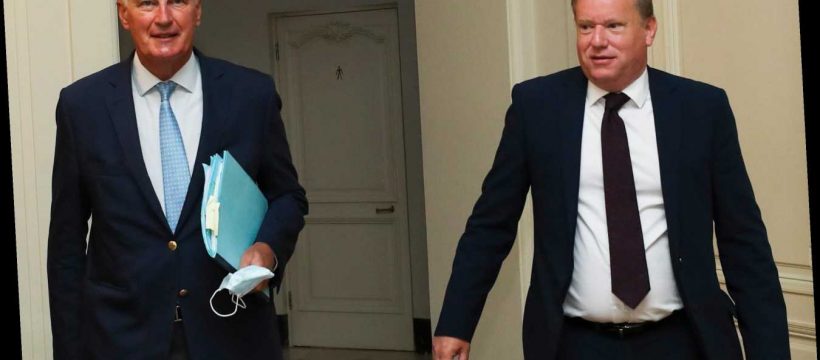BRITAIN's Brexit chief has urged the EU to show "realism" as fresh talks in London today are hanging on by a thread.
David Frost urged EU chief negotiator Michel Barnier to ease up on hardline stances to "make progress" by the PM's October 15 deadline.
Lord Frost said today: "I will sit down with Michel Barnier and drive home our clear message that we must make progress this week if we are to reach an agreement in time.
“We have now been talking for six months and can no longer afford to go over well-trodden ground."
"We need to see more realism from the EU about our status as an independent country."
Mr Barnier and Lord Frost will meet in London today for the eighth round of talks, after both sides ramped up the rhetoric yesterday, with Boris Johnson threatening to walk away from talks if there was no agreement in time for the European Council meeting in five weeks.
Mr Johnson was not concerned about the prospect of a no-deal Brexit, saying Britain would "prosper mightily".
Relations between the UK and EU hit an all time low yesterday, after it was revealed by the Financial Times planned legislation due to be published tomorrow would override parts of the original Withdrawal Agreement.
Top EU negotiator Michel Barnier said talks would end if the Withdrawal Agreement – and particularly the Northern Ireland Protocol, which avoids a hard border – were not honoured.
But London insisted they were merely seeing off back-door control from Brussels through "clarifications" to the protocol.
Q&A
BOTH Boris Johnson and Brussels say trade talks are stuck on major issues — state aid, fish and Northern Ireland — but both agree a deal has to be done by next month. So what are the sticking points really about?
Q: Why October?
A: Brussels says a deal is needed by October 31 at the latest if the EU Parliament is to have enough time to scrutinise and vote on it. The PM agrees — setting an even earlier October 15 deadline. Both sides agree firms need to be given enough time to prepare.
Q: What is state aid?
A: State aid is financial assistance given to individual businesses or certain sectors of the economy by the Government. Brussels does not want the UK to give domestic companies an unfair advantage after Brexit. But Mr Johnson says it’s our right to do what we want as an independent nation.
Q: Why the row over fish?
A: UK trawlermen say they have suffered for years under the bloc’s Common Fisheries Policy. No10 wants to change how quotas are divvied up, doubling the spoils for our fishermen. But EU bosses say the result will wipe out a third of the EU’s fleet.
Q: What is the NI Protocol?
A: It’s a legal fix bolted on to last year’s Brexit deal to make sure there’s no return to a hard border in Ireland. Both sides agreed Northern Ireland will, in effect, stay in the EU’s single market. But a row has broken out over what would happen in a No Deal scenario.
Q: What does the UK want?
A: The UK wants to exempt some goods heading from GB to NI, such as supermarket products and live animals, from some checks and automatic tariffs. It is also seeking a workaround on EU rules which will mean all companies sending items from NI to GB will have to fill out exit declarations.
Q: What does the EU want?
A: In a recent speech Michel Barnier vowed to make sure the EU’s customs code is “applied in its entirety” for all goods entering and leaving NI.
Q: How does this affect talks?
A: EU boss Ursula von der Leyen says there will be no trade deal unless the Protocol is honoured in full.
Q: What happens next?
A: The two sides will meet in London today. If the UK and EU cannot reach an agreement by the end of the year, full tariffs and quotas will be applied to all goods traded between the UK and the EU.
EU boss Ursula von der Leyen warned Boris that implementing the Northern Ireland Protocol in full was a "prerequisite" for any future trade deal with the bloc.
Lord Frost said he will hammer home the PM's message that the UK needs a Canada-style deal which removes trade barriers but cuts the nation free from the bloc's tightly controlled rules and regulations.
The Brexit chief said: "We have listened carefully to our EU counterparts, signalled flexibility where possible to move the talks forward and tables new proposals to make progress.
"But we have repeatedly made clear that key elements of our position derive from the fundamentals of being a sovereign state, and it's time for the EU to fully recognise this reality."
Lord Frost added the UK is already scaling up preparations for a situation where it is trading "on terms like those the EU has with Australia".
The Australia-style trading relationship amounts to trading on WTO rules, but allows both sides to cherry-pick areas they can find agreement on.
Two of the big sticking points prevent the talks from making progress are state aid – the extent to which the government can subsidise private companies – and fishing rights in British waters, where EU states want to continue the "status quo".
Foreign Secretary Dominic Raab argued given the context of Covid, the UK could not be hampered by EU rules on state aid.
And ministers have repeatedly insisted Britain must regain control over its waters by overhauling the current quota system and give British trawlers double the number of catches.
Source: Read Full Article



